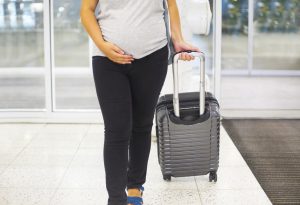In this Article
- Is Travelling Safe During Pregnancy?
- Travelling in the First Trimester
- Travelling in the Second Trimester
- Travelling in the Third Trimester
- Road Travel During Pregnancy
- Air Travel During Pregnancy
- Sea Travel During Pregnancy
- Train Travel During Pregnancy
- When Should Pregnant Women Avoid Travelling?
- Safety Tips for Travelling During Pregnancy
Pregnancy can be a tiring and overwhelming time to engage in travel. Many people think it is best not to travel during pregnancy. But, life is unpredictable, and you may be forced into a situation where you have to travel, such as permanently shifting to another city. During this time, you may naturally be facing the dilemma of whether it is safe to do so.
Most pregnant women are worried about the safety of the baby, especially during long-distance travel. The important thing is to understand that you need to keep your developing baby safe and prevent any unnecessary complications through the course of your pregnancy. However, if you cannot put off travel due to an emergency or work, you can always discuss the options with your doctor and ensure that it is as safe as it can be.
But, if you want to prepare yourself before you talk to your doctor, this article should provide you with all the information you could use. Read on to know more about travelling in each trimester by road, rail and airways.
Is Travelling Safe During Pregnancy?
It is safe to travel throughout most of your pregnancy unless you have pregnancy complications that need special attention. If that is not the case, the best time to travel is in the second trimester when you are past your morning sickness. Travelling during the third trimester is also possible, but you could be prone to fatigue and discomfort. Due to the risk of labour, air and boat travel after the 36th week is not recommended.
Travelling in the First Trimester
Travelling during early pregnancy, although possible, is generally not advised due to the various risks it carries. The first trimester is when you experience most of the pregnancy symptoms like morning sickness, nausea, vomiting, etc. Also, you may be at a higher risk of miscarriage during the first trimester. Trauma during pregnancy could also affect foetal development. Hence, long-distance travel by road and air is not recommended. However, you may consult your doctor to evaluate your pregnancy, and your doctor may permit travel if your pregnancy is stable.
Travelling in the Second Trimester
If you have to travel, the second trimester is your best bet. This is when the risk of miscarriage is considerably low. You will also notice that your pregnancy symptoms like nausea and morning sickness have reduced, which can make it much more comfortable to travel. However, if you have any serious complications, travelling may still not be advised. It is best to consult your doctor and discuss your travel plans ahead of time, even during the second trimester.
Travelling in the Third Trimester
While travelling in the third trimester is not problematic, you are likely to experience fatigue due to the weight of the growing baby. This can increase discomfort and make travel physically stressful for you. Also, if you have conditions like oligohydramnios or polyhydramnios, it is recommended that you do not travel and prevent complications. If you have to travel, you will also need to check with the airlines before you book the ticket. Most airlines do not permit women past 36 weeks to travel due to the possibility of labour.
Now let’s take a look at how the different travel options could affect you if you happen to travel during pregnancy. We have also provided some tips that could make travelling easier for you. Read on to know more.
Road Travel During Pregnancy
Travelling by road during pregnancy can be convenient, especially for short distances. Driving in a car allows you to make as many stops as you require in order to stretch and walk. You can also avoid the high altitude sickness that may occur in air travel.

Things to Remember
If you wish to travel by road, you need to keep in mind the following things before you hit the road.
1. Before Travelling
- Keep your medical and prenatal records in the car.
- Carry a mobile phone for emergencies.
- Keep some homemade snacks in the car to avoid eating from random places.
- Keep enough bottled water in the car to stay hydrated.
- If you are travelling along, keep a family member or a close friend informed about your travel. Sharing location is a good idea to reduce the number of incoming calls from worried family members or friends.
- Research on the route you will be taking. You need to know all the possible places where you can find a restroom to relieve yourself when needed.
2. During Travel
- Keep your seat belt latched at all times below your belly.
- If you’re in the passenger seat, push your seat back completely to give you enough room to stretch.
- If you’re driving, push the seat back as much as possible for a comfortable seating position.
- Stay hydrated by drinking plenty of water on the road.
- Eat healthy snacks to avoid nausea.
- Keep a cushion or a small pillow between the seat and your back to avoid back pain.
- Stop as often as possible to stretch and walk to keep your blood circulating.
3. What to Avoid
- Try to avoid long road trips.
- Avoid eating street food.
- Avoid wearing restrictive or tight clothing.
- Avoid taking routes that have bumpy roads.
- As long as possible, avoid travelling alone.
4. When You Disembark
- Get plenty of rest.
- Re-hydrate and eat.
- Do not go on another long journey without getting ample rest.
- If required, check with a local doctor and ensure you are good to carry on with your travel plans.
Air Travel During Pregnancy
Air travel can be a safe option for many pregnant women, as there are no sudden movements involved. It is especially convenient for long-distance travels. However, flights can get cramped up and cause inconvenience, especially when you need to stretch.

Things to Remember
With proper precautions, air travel can be made as hassle-free as possible to avoid any discomfort for you.
1. Before Travelling
- Pack light and carry all your medications.
- Wear comfortable and loose clothing.
- Wear roomy shoes to prevent any discomfort due to possible swelling.
- Request for an aisle seat near the exit to get more leg space.
- Request to be searched by a wand or manually instead of the scanning machine.
2. During Travel
- Always keep your seat belt on.
- Drink enough fluids to keep yourself hydrated.
- Stretch your ankles and legs regularly, especially on long flights, in order to avoid swelling or blood clots due to high cabin pressure.
- Try to take a walk often to keep your blood circulating.
- Seek help from the stewards if you feel any discomfort.
3. What to Avoid
- Avoid smaller private planes and travel on major airlines with pressurised cabins.
- If you do ride in smaller planes, avoid altitudes above 7000 feet.
- Avoid travelling by air after 36 weeks of pregnancy to avoid preterm labour.
4. When You Disembark
- Stretch your legs and ankles to loosen your muscles.
- If you feel any discomfort on landing, contact your doctor for advice.
- Take rest and get plenty of sleep.
Sea Travel During Pregnancy
Unless you suffer from seasickness or have other pregnancy complications, sea travel during pregnancy should be safe for you. Here’s what you should remember if you plan to travel by sea during pregnancy.
Things to Remember
1. Before Travelling
- Pack your medications and ensure that they last you throughout the voyage.
- Carry your medical and prenatal records.
- Get a diet chart from your doctor with the things you can and cannot eat.
- Keep track of the safety measures on the cruise.
- Check the schedule and know how much time you have at each port.
- Verify with the relevant offices to ensure that the ship has cleared all the inspections. This will ensure no delays, and you should reach your destination as per the schedule.
2. During Travel
- Eat healthy and nutritious food. As long as possible, stick to your diet chart.
- Drink plenty of water and stay hydrated.
- Utilise the walking space and take regular walks.
3. What to Avoid
- Avoid spending a lot of time on the deck to prevent sunburn and overheating.
- Keep track of the seafood and fish that you eat. Some of them contain mercury which can hamper brain development in the foetus. Check with your doctor beforehand about what you can and cannot consume.
- Don’t walk on slippery surfaces to prevent falls.
- Avoid eating local food at the ports.
- Avoid common pool areas to prevent infections. Instead, opt for a private pool or Jacuzzi.
- Avoid water and adventure sports.
4. When You Disembark
- If you feel any discomfort that you are unable to handle, it is best to disembark midway and contact a medical practitioner immediately.
- Eat nutritious food, stay hydrated and rest well.
Train Travel During Pregnancy
Travelling by train can be more convenient and does not trigger nausea. You also get more legroom and enough space to walk around and stretch throughout the journey. However, not every pregnant lady will have the same experience; the stress of travelling could get to you. Here’s how you can prepare for a train journey during your pregnancy.

Things to Remember
1. Before Travelling
- Book a direct train ticket with the least number of stops.
- Carry a pillow to support your back.
- Reserve a lower birth for convenience.
- Get a porter to carry your luggage onto the train.
- Request for a seat near the washroom.
- Wear comfortable clothes and shoes.
- Pack enough healthy, homemade snacks and water for your trip.
2. During Travelling
- Rest your legs and put up your feet as often as you can.
- Take walks regularly inside the train with proper support.
3. What to Avoid
- Avoid buying food from vendors. Carry homemade food instead.
- Try to avoid moving between coaches or using the washroom when the train is moving.
- Avoid travelling alone and travel with at least one person to support you.
- Do not board the train when it is moving.
4. When You Disembark
- Be careful of slippery steps while getting off the train.
- Wait until the other passengers have disembarked to avoid a rush.
- Hire a porter to carry your luggage.
So now you know how each mode of transport could affect you during your pregnancy and how you need to be prepared to ensure you reach your destination without much inconvenience. Here, we shall talk about when you should completely avoid travelling. Read on to know more.
When Should Pregnant Women Avoid Travelling?
Travelling during pregnancy should be avoided in the following cases:
- History of Miscarriage or Preterm Birth: If you or anybody in your family have had prior miscarriages or preterm labour, it is best to avoid travel.
- Multiple Pregnancies: If you are pregnant with twins or more, your doctor may advise against travel. This is because multiple pregnancies make you more prone to preterm labour.
- Preeclampsia or High Blood Pressure: Women with preeclampsia may face certain complications during pregnancy. Travel can tire you out and give rise to more complications.
- Placental Abnormalities: Conditions like placenta previa and placental abruption can pose a significant risk to you and the baby. Bleeding may also be common if you suffer from these conditions. Travelling in this condition is not advised as it can increase the risk of pregnancy-related complications.
- Gestational Diabetes: Women with gestational diabetes require adequate rest and care as severe cases may lead to complications during childbirth. Hence, travel should be avoided if you have gestational diabetes.
- Incompetent Cervix: A weak cervix increases your risk of preterm labour, and heavy movement may trigger a break of the membrane, causing labour. Plenty of bed rest is recommended in order to rule out these complications.
- Heavy Bleeding During Pregnancy: Some bleeding during pregnancy is common. However, if you have experienced heavy bleeding, it is wise to cancel your travel plans to avoid any complications and discomfort.
- Ectopic Pregnancy: Ectopic pregnancy is a serious risk to the mother. If it is an ectopic pregnancy, especially along with preeclampsia, it is best to avoid travel to reduce complications.
Safety Tips for Travelling During Pregnancy
- Stretch Your Muscles: It is important that you keep blood circulating through your body all through your travel. Therefore, whenever possible, exercise or take breaks, walk and stretch your legs often. This will prevent the risk of deep vein thrombosis (DVT), which can lead to potentially dangerous blood clots.
- Pack a Travel Kit: Carry a travel kit with compression socks, prenatal vitamins, haemorrhoid cream, medical documents, your doctor’s contact details, healthy snacks, hand sanitizer, medication (pregnancy appropriate), etc.
- Hydrate: Remember to stay hydrated throughout the travel. Avoid drinks with caffeine and excessive sugar.
- Consult Your Doctor: Discuss your travel plans with your doctor, including where you will be travelling. Your doctor will be able to provide all the necessary advice and suggest required medical precautions. You will also need to go for routine check-ups to ensure that you are in optimal health for travel.
- Eat and Drink Wisely: As far as possible, avoid consuming outside food, but if you have to drink only bottled water and ensure the food is cooked properly. If you need to drink some milk, ensure it is pasteurized.
- Get Travel Insurance: Make sure that your travel insurance covers your pregnancy and medical bills if you go into labour.
- Check With the Airline: If you are travelling by air, ensure that the airline permits travel, as most airlines do not permit pregnant women beyond 36 weeks to travel. Once you do book a ticket, request for a seat with more legroom for you to stretch your legs.
- Stay Comfortable: Dress in comfortable clothes, protect yourself from the sun and ensure that you listen to the cues of your body. If you feel any discomfort, contact the nearest medical practitioner and get plenty of rest.
- Do Not Rush: Be patient when you board off. Allow the other passenger to move ahead to prevent any pushing.
- Exercise Hygiene: Ensure proper hygiene when using washrooms and toilets. If you have the choice, use a squat toilet instead of a western toilet to avoid getting an infection. If you are travelling with a spouse or a friend, ask them to wait for you outside the washroom for safety reasons.
Although travelling during pregnancy is not recommended, it is possible with the right precautions and care. You consult your doctor for approval before engaging in any long-distance travel. Also, go for routine check-ups to rule out any complications that may prevent you from travelling. Safe travel requires a good amount of planning and precautions. This is especially true when you are pregnant to ensure the safety of both you and your developing baby.
References:









